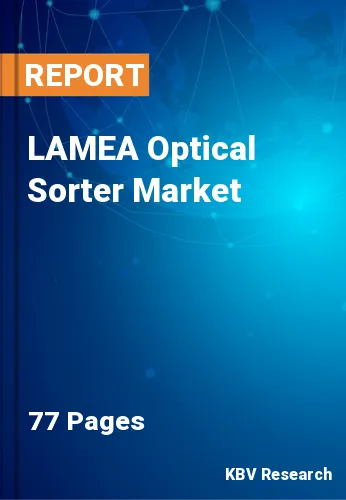The Latin America, Middle East and Africa Optical Sorter Market would witness market growth of 11.7% CAGR during the forecast period (2021-2027).
Automation can help businesses enhance their performance by reducing errors and increasing efficiency. Automation is being used in a variety of industries to speed up processes while preserving product quality. Because of this method, these sectors are able to decrease manual labor, improve hygiene, as well as speed up procedures. Growing automation in key optical sorter target areas like recycling, food, and mining is considered as a positive sign for market growth. In recent years, creative and innovative methods have been utilized to manage and minimize specific waste, including food and plastic waste.
Optical sorting devices are used in the coffee industry to identify and eliminate undeveloped coffee beans known as quakers. Quakers are beans that are primarily carbs and sugars. A more precise calibration result in fewer defective items overall. In order to provide a finer coffee, some coffee firms, such as Counter Culture, use these devices in addition to existing sorting processes. Food items like mustard seeds, wheat, fruits, and hemp may all be processed using optical sorting equipment.
The GCC countries, which are located in one of the world's wealthiest regions, are also among the largest trash generators per capita. The Gulf Petrochemicals and Chemicals Association recently published two studies, one for the UAE and one for Oman, to better understand the gaps in plastic waste management. The investigations are intended to illuminate the existing waste management situation in both nations, as well as the current condition of plastic recycling, along with difficulties and prospects in plastic waste management.
According to the study by Gulf Petrochemicals & Chemicals Association, just 4% of the 420,000 MT of post-consumer plastic trash created in Oman is now recycled, while the remaining 85% is thrown in landfills. Oman has the potential to recycle an additional 40,000 MT of plastic garbage. This has the potential to bring significant value to Oman's economy in terms of value creation and retention, job growth, diversity, and environmental protection.
The Brazil market dominated the LAMEA Optical Sorter Market by Country 2020, and would continue to be a dominant market till 2027; thereby, achieving a market value of $67.5 million by 2027. The Argentina market is exhibiting a CAGR of 12.3% during (2021 - 2027). Additionally, The UAE market would experience a CAGR of 11.4% during (2021 - 2027).
Based on Application, the market is segmented into Food, Recycling, and Mining. Based on Platform, the market is segmented into Belt, Lane, Hybrid, and Freefall. Based on Type, the market is segmented into Cameras, Lasers, Hyperspectral cameras & Combined Sorters, NIR (near-infrared) and Others. Based on countries, the market is segmented into Brazil, Argentina, UAE, Saudi Arabia, South Africa, Nigeria, and Rest of LAMEA.
Free Valuable Insights: The Global Optical Sorter Market is Predict to reach $3.8 Billion by 2027, at a CAGR of 9.3%
The market research report covers the analysis of key stake holders of the market. Key companies profiled in the report include Buhler Group, Tomra Systems ASA, Hefei Meyer Optoelectronic Technology, Inc., Allgaier Werke GmbH, Key Technology, Inc. (Duravant LLC), Hefei Taihe Intelligent Technology Group Co., Ltd., STEINERT GmbH, Sesotec GmbH, CP Global, and Satake USA, Inc. (Satake Corporation)
By Application
By Platform
By Type
By Country
Companies Profiled
Our team of dedicated experts can provide you with attractive expansion opportunities for your business.

